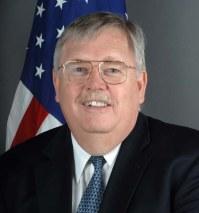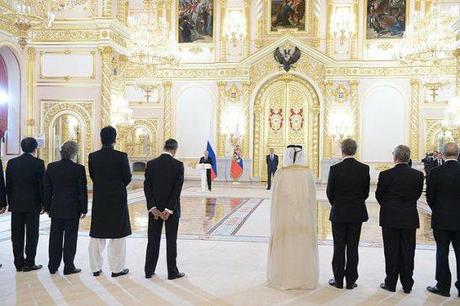Russian President Vladimir Putin’s senior foreign policy advisor, Yuri Ushakov, has signaled to Washington that Moscow will agree to the appointment of John Tefft as the next Ambassador to Russia. Although cautious, Ushakov in an interview with the Russian news agency ITAR-TASS called Tefft a “professional diplomat” with previous experience in Moscow.

Still ahead are the US Senate hearings once the Obama administration makes the formal nomination. Confirmation shouldn’t be a problem as Tefft is no stranger on Capitol Hill, with foreign service experience dating back to 1972. Most recently Mr. Tefft was the US Ambassador to Ukraine from 2009 to 2013 and he has served previously in the Moscow Embassy under deputy roles. From 2000 to 2003 he was the US Ambassador to Lithuania and the US Ambassador to Georgia during 2005 to 2009.
The nomination of Tefft , who speaks Russian and Ukrainian, is likely to be well received in the Senate after the debacle with the inexperienced Michael McFaul in the position. The Russians say that the Obama administration made the initial request regarding Tefft in June and their announcement of acceptance came while Russian President Putin was in Cuba as part of his diplomatic tour to Latin America.
The annexation of Crimea and the continued fighting in Eastern Ukraine have left relations in tatters between Russia and the United States, some going so far to call the chill a new “Cold War.” Adding to the tension is the suspicion that Tefft’s appointment is due to his experience with so-called “color revolutions.” He served in Ukraine at a time of regime change and he was the US Ambassador to Georgia during the Russian invasion of Georgia in 2008.
Pravda wrote this week that Russia could not afford to trust Tefft regardless of his prior experience in Russia. Andrei Kortunov, of the Moscow based New Eurasia Foundation, was quoted in Pravda saying that the Tefft appointment would not automatically signal a renewal of open dialog with Russia. Kortunov pointed to the failures of the McFaul ambassadorship and current tensions regarding Crimea and the conflict in Eastern Ukraine.
Both countries must approve Ambassadorial appointments and foreign diplomats are received when the incoming Ambassador formally presents diplomatic credentials to the host nation. Traditionally foreign ambassadors present their credentials to Russia’s president and foreign minister during ceremonies held in the Grand Kremlin Palace’s the Alexander Hall.

June 2014 reception of new Ambassadors in the Grand Kremlin Palace.
Of interest to some is that Tefft’s wife will join him in Moscow. Many Russians didn’t understand why previous Ambassador Michael McFaul chose to leave his family in California while trying to make the 9,000 kilometer weekly commute fit his Embassy schedule.



